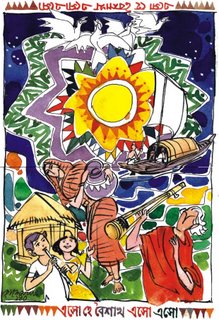Saturday, April 15, 2006
Pahela Baishakh through the ages

Pahela Baishakh, the first day of the Bangla year, is celebrated by the Bengalis all over the world. In Bangladesh the day usually falls on April 14 or 15. The history of observance of Pahela Baishakh is quite interesting as its history goes back to the time of the Mughals. It is said that the collection of agricultural taxes used to be done in that period according to the Hijri calendar. But the collectors faced some problems in collecting the taxes as the Hijri calendar is a lunar calendar and the agricultural year did not coincide with it. As a result, farmers often found it oppressing on them to pay taxes during the out of season period. This prompted the rulers to find a solution and soon they came up with the brilliant calculation table of the years on the basis of an order of the Mughal Emperor Akber. Accordingly, Fatehullah Shirazi, a renowned scholar and astronomer of the time formulated the Bangla year on the basis of the lunar Hijri and Bangla solar calendars. The new Fasli San (agricultural year) was introduced on 10/11 March 1584, but was dated from Akbar's ascension to the throne in 1556. The new year subsequently came to be known as Bangabda or Bengali year.
Celebrations of Pahela Baishakh started from Akbar's reign. It was customary to clear up all dues on the last day of Chaitra. On the next day, or the first day of the new year, landlords would entertain their tenants with sweets. On this occasion there used to be fairs and other festivities. In due course the occasion became part of domestic and social life and turned into a day of merriment.
The main event of the day was to open a halkhata or new book of accounts. This was wholly a financial affair. In villages, towns and cities, traders and businessmen closed their old account books and opened new ones. They used to invite their customers to share sweets and renew their business relationship with them.
New year's festivities are closely linked with rural life in Bengal. Usually on the day everything is scrubbed and cleaned. People bathe early in the morning and dress in fine clothes and then go to visit relatives, friends and neighbours. Special foods are prepared to entertain guests. Baishakhi fairs are arranged in many parts of the country. Various agricultural products, traditional handicrafts, toys, cosmetics as well as various kinds of food and sweets are sold at these fairs. The fairs also provide entertainment, with singers and dancers staging jatra, Palagaan, Kavigaan, Jatra, Gambhira, Gazir gaan etc. They present folk songs as well as baul, marfati, Murshidi and Bhatiali songs.
Observance of Pahela Baishakh has become popular in the cities. Early in the morning people gather under a big tree or on the bank of a lake to witness the sunrise. Artistes present songs to welcome the new year. People from all walks of life wear traditional Bengali dresses: young women wear white saris with red borders and adorn themselves with bangles, flowers, and tips. Men wear white pyjamas or dhoti and kurta. Many townspeople, start the day with the traditional breakfast of panta bhat (cooked rice soaked with water), green chillies, onion, and fried hilsha fish.
The most colourful new year's day festival takes place in Dhaka. Large numbers of people gather early in the morning under the Banyan tree at Ramna Park where Chayanat artistes open the day with Tagore's famous song, Eso he Baishakh eso eso (Come O Baishakh, come), welcoming Baishakh. A similar ceremony welcoming the new year is also held at the Institute of Fine Arts. Students and teachers of the institute take out a colourful procession and parade round the campus.
Baishakh in other communities
The Hindu communities in India, where the holiday is called Baisakhi, also celebrate the beginning of Spring and the end of the harvest seasion on Pahela Baishakh. The Sikh communities celbrate Vaisakhi because it is the birth of the Sikh order of the Khasla. Vaisakhi is also called Rongali Bihu in Assam, Puthandu in Tamil Nadu and Pooram Vishu in Kerala.
In Buddhist communities, the month of Baishakh is associated with Vesak, known as Visakah Puja or Buddha Purnima in India, Visakha Bucha in Thailand, Waisak in Indonesia and Wesak in Sri Lanka and Malaysia. It commemorates the birth, Enlightenment and passing of Gautama Buddha on the one historical day, the first full moon day in May, except in a leap year when the festival is held in June. Although this festival is not held on the same day as Pahela Baishakh, the holidays typically fall in the same month (Baishakh) of the Bengali, Hindu, and Theravada Buddhist calendars, and are related historically through the spread of Hinduism and Buddhism in South Asia.
-- Based on information given in Banglapedia and Internet.